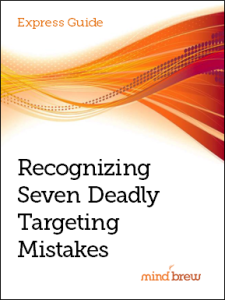K-12 teachers in the United States spend a lot of time trying to teach their students to be good problem-solvers. By the time we’re adults, it’s really second nature for us to look for problems and then solve them. Some companies even send employees to workshops or team-building activities where they can improve their problem-solving ability. And some of us enjoy the process so much that we do crosswords or jigsaw puzzles or Sudoku for fun in our spare time.
Unfortunately, all this emphasis on problem-solving can backfire.
In fact, when it comes to marketing, the best-performing companies spend very little time on problem-solving. Instead, they focus on doing more of what is working well. Instead of asking, “What went wrong?” they ask “What went right?”
To see how this actually plays out in a real-life scenario, consider a less-than-successful content marketing campaign. Imagine that your organization put together a white paper that you advertised on a particular website hoping to generate 100 qualified leads. But the campaign falls short of its goals, generating only 75 qualified leads.
Problem-focused marketers will look at this situation and ask, “Why didn’t more qualified leads download this white paper?” Unfortunately, there’s not a really good way to find the answer to this question, so most marketers will rely on their gut instinct. They might conclude that the white paper wasn’t as strong as it could have been or maybe that the website promoting the white paper wasn’t a good fit. And then they’ll probably try again with a new content marketing piece and/or promotions on a different website. The second try may or may not be more successful than the first attempt, depending on how good the marketers were at guessing.
Best-practices marketers will look at that same situation and ask, “Why did those 75 qualified leads download the white paper we offered?” The benefit of this question is that they can find the answer pretty easily—they just have to call or email a couple of the qualified leads and ask them what they liked about the paper and why they downloaded it. This approach is much more likely to yield new insights into your customers and prospects. For example, maybe you’ll discover that prospects from a particular industry or from organizations of a certain size were especially interested in one aspect of that paper. For their next attempt, the marketers might put together a new white paper that emphasizes the thing that attracted the qualified leads, or maybe they’ll simply repurpose the existing paper with a new headline and promote it on a website that attracts the type of customers who downloaded the first paper. This second attempt is much more likely to experience greater success because it’s based on market realities, not just guesses.
Of course, there are situations where marketers do need to do some problem-solving. If your current marketing processes are badly broken, you do need to fix them. But our research shows that in the long run, organizations that focus on replicating their strengths do better than those that worry about fixing their weaknesses.
Emphasizing strengths rather than weaknesses is just one of the characteristics of companies that take a more strategic approach to marketing. You can find out about the others in the webinar How to Be a More Strategic B2B Marketer. It offers ten suggestions for things your marketing team could do right now to help your company be more successful.







